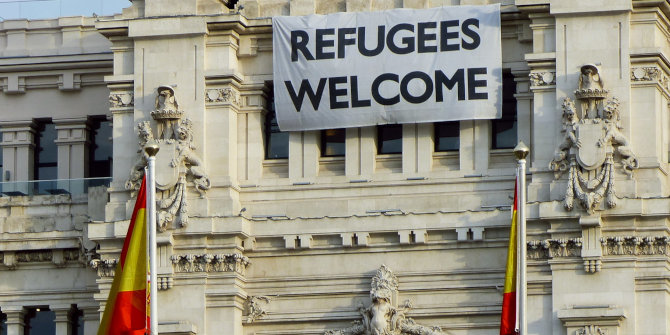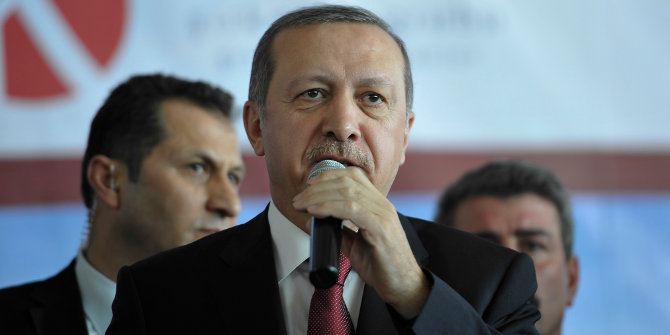 Populist politicians frequently champion direct democracy, yet other actors view populists as a threat to the democratic system. Ben Margulies draws on the work of Karl Polanyi in attempting to resolve this contradiction. He explains that populists typically believe democracy should be a vehicle for the people’s will, but crucially the people may never have the chance to change their minds – without the liberal principles of dividing and limiting powers, democracy might quickly transform into an autocracy.
Populist politicians frequently champion direct democracy, yet other actors view populists as a threat to the democratic system. Ben Margulies draws on the work of Karl Polanyi in attempting to resolve this contradiction. He explains that populists typically believe democracy should be a vehicle for the people’s will, but crucially the people may never have the chance to change their minds – without the liberal principles of dividing and limiting powers, democracy might quickly transform into an autocracy.
The crises of the 21st century have been, on the whole, a rather depressing and unedifying experience. But for some 19th and 20th century authors, they have been an opportunity to return to the centre of public debate. The financial crisis brought Karl Marx and John Maynard Keynes renewed attention at the end of the 2000s. The increasing backlash against globalisation and the establishment, in turn, has brought some new attention to another giant of the 20th century, Karl Polanyi.
In one of his most renowned works, The Great Transformation (1944), Polanyi examined the theory and history of the free market, and how its development led to the global conflagrations that marked his own life. Polanyi argued that the free market – far from being something that human societies naturally constructed – was the product of positive legal and policy changes originating in England in the early modern era.
With the development of commercial agriculture and mass production, English (or British) capital required markets in labour, land and money, which Polanyi called “fictitious commodities.” These had to be tradable in absolutely free markets to supply the vast labour needs of modern capitalism. Furthermore, this system had to be extended globally to ensure markets for industrial output and the continued expansion of the system.
Market rule had some beneficial effects. Polanyi noted that it created institutional pressures in favour of world peace and constitutional government, both of which were necessary to maintain free trade and stable currencies. Indeed, Polanyi identified the pre-World War I international financial system with the maintenance of peace. (Norman Angell postulated something similar in The Great Illusion in 1909.)
But ultimately, Polanyi argued that the market system was not sustainable. Treating labour, land and money as commodities, rather than necessities for human existence, quickly proved intolerable. Labour was worn out and pauperised; the land was despoiled, and farmers left impoverished by globalisation. Maintaining a gold standard brought stability, but also made it extremely difficult to expand the economy and service debts. Before the 19th century was out, a series of “counter-movements” emerged to challenge the markets – protectionism for the farmers; central banking for the debtors; and unions and socialist parties for the workers. In time, protectionism led to feuding national trade blocs, imperialism and World War I – the latter, combined with the socialist threat, brought us fascism.
It’s pretty easy to see why Polanyi has become more visible in political discussions in the last few years. Frequently, populism in general, and specific populist victories in particular, are described as revolts against globalisation. As early as the 1990s, Hans-Georg Betz identified radical-right populist voters as “modernisation losers.” A paper by the National Bureau of Economic Research finds that Republican voting is associated with exposure to trade competition with China. If we take migration as a form of a “free market in labour,” the idea of populism as a “counter-movement” becomes still sharper.
However, here I want to extend one of Polanyi’s underlying themes – the theme of overuse or overexploitation. Polanyi’s thesis in The Great Transformation is that capitalism, if left to its own devices, is not sustainable. It destroys its labour force, bankrupts its enterprises and obliterates entire rural societies. It cannot maintain “social reproduction.” Like farmers eating their own seed corn, or drug dealers becoming addicted to their own supplies, capitalism destroys what nurtures it.
This tendency towards overexploitation, towards a blithe disregard of limitations, can also be found in the various counter-movements to globalisation. Polanyi’s work dealt with the contemporary threat of fascism. This was a “palingenetic ultranationalism” bent on reviving the national community through acts of will and violence. Ultimately, this would result in only one of two outcomes – either the state tamped down on the violence and evolved towards a less ambitious conservative regime (as in Spain), or the state pursued an ever-escalating policy of aggression leading to global war (as in Nazi Germany). All three Axis powers, inclined to believe that peaceful coexistence would lead to spiritual and physical decay, instead launched wars that they were, at best, unlikely to win. They took the concept of a national will and extended it to the destruction of the nation itself, like a jogger who decides to run an ultra-marathon, only to drop dead of a heart attack ten kilometres in.
Contemporary populism – whether left-wing or right-wing – is rather different from fascism, not least because it does not endorse violence as a form of political expression. Where fascism and populism do coincide, however, is that they both draw on the concept of national will, on the idea of sovereignty. Populism relies on both anti-elitism and the belief, as Cas Mudde has put it, that “politics should be an expression of the volonté générale (general will) of the people.” Margaret Canovan has described populism as a belief in democracy’s redemptive power to change lives and social structures, as opposed to the idea of democracy as an orderly procedural arrangement.
Of course, all democrats believe that democracy should be a vehicle for the people’s will. But populists – or at least, the most purist among them – believe it should be so to the exclusion of all other considerations. They ignore the procedural aspects of democratic theory, and the protection of individual rights, and the limitations on the power of the state itself. The majority’s will alone matters, as expressed via the medium of elections and the person of the elected leader. And the opposition, too, becomes more like its opponents, adopting an obsessive focus on the evil populist leaders and their parties.
The result is that this use – or abuse – of sovereignty quickly burns out all the supporting institutions and behaviours that allow democracy to reproduce itself. Once the populist leadership has overcome checks and balances and menaced the opposition, it can also influence or interfere with elections. As illustrated in a recent study of Alberto Fujimori’s Peru, once the populists are ensconced in power, they can prevent the formation and expression of alternative majorities. The people can never change their minds – once they have used their sovereignty to the utmost, they will find they have destroyed all the institutions and habits necessary to continue using it in the future. This is one reason why Jan-Werner Müller suggests that a populist democracy is no democracy at all – without the liberal concerns with fractionalising and limiting power, democracy quickly becomes autocracy.
Of course, not every politician described as a populist is equally hostile to checks and balances, or equally effective at dismantling them. Some Western European populists vent their illiberal impulses on immigrants without much changing the constitutional order (in which case, they may be more authoritarian than populist). Much depends on whether the populists are in power or in opposition; whether they rule in coalition governments or alone; and the strength of institutions and rival actors that populists face. But cases like Fujimori’s Peru and Orbán’s Hungary serve to illustrate my general idea in practice.
Polanyi’s work on counter-movements is especially relevant for the juncture in which we find ourselves today. However, his work contains a simpler, more transcendental conclusion about politics and political economy that we would do well to learn. Any system that is allowed to express itself without checks, or without recognising the plural nature of modern societies, will not only become oppressive. In the end, it will also become unsustainable. The unimpeded market will destroy the people, money and land it relies on; the fascists will dash their states and their Volks against the rocks; and the populists will ultimately destroy democracy in order to save it. Perhaps the greatest lesson Polanyi can teach us today is that of restraint.
Please read our comments policy before commenting.
Note: This article gives the views of the author, not the position of EUROPP – European Politics and Policy or the London School of Economics. Featured image: Piet Mondrian, 1921 (Public Domain)
_________________________________
 Ben Margulies – University of Brighton
Ben Margulies – University of Brighton
Ben Margulies is a Lecturer at the University of Brighton.





